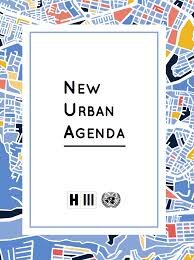The New Urban Agenda was adopted at the United Nations Conference on Housing and Sustainable Urban Development (Habitat III) in Quito, Ecuador, on 20 October 2016. It was endorsed by the United Nations General Assembly at its sixty-eighth plenary meeting of the seventy-first session on 23 December 2016.
The New Urban Agenda presents a paradigm shift based on the science of cities; it lays out standards and principles for the planning, construction, development, management, and improvement of urban areas along its five main pillars of implementation: national urban policies, urban legislation and regulations, urban planning and design, local economy and municipal finance, and local implementation. It is a resource for every level of government, from national to local; for civil society organizations; the private sector; constituent groups; and for all who call the urban spaces of the world “home” to realize this vision.

